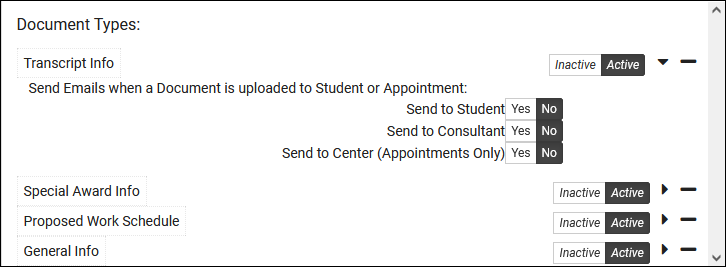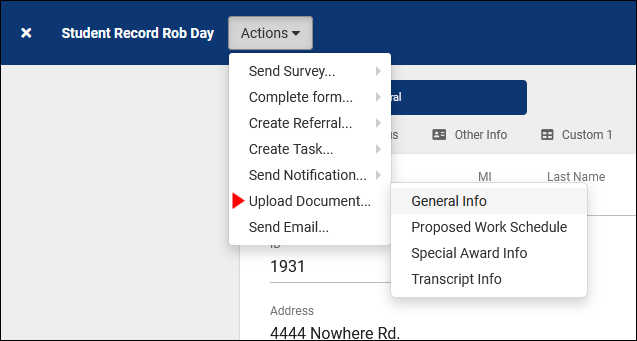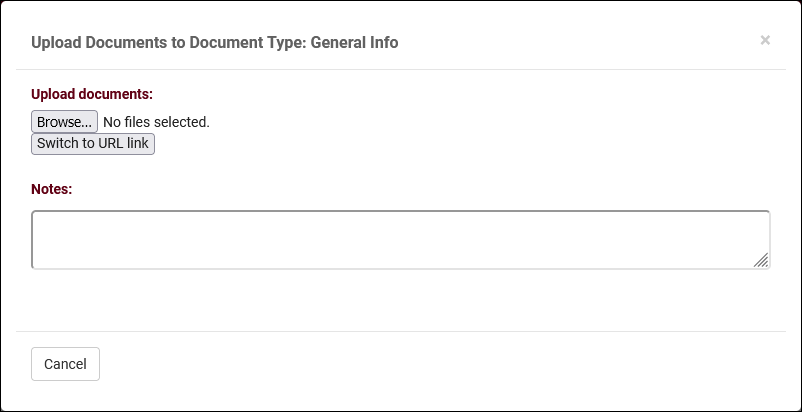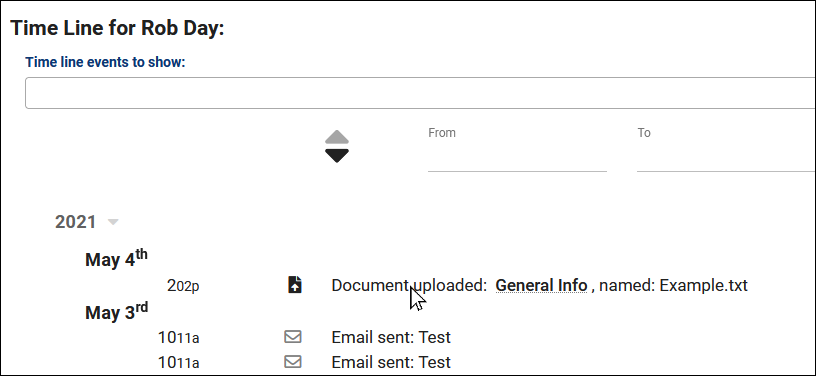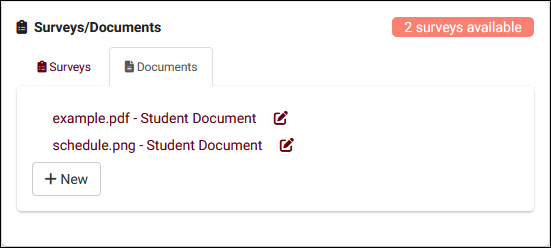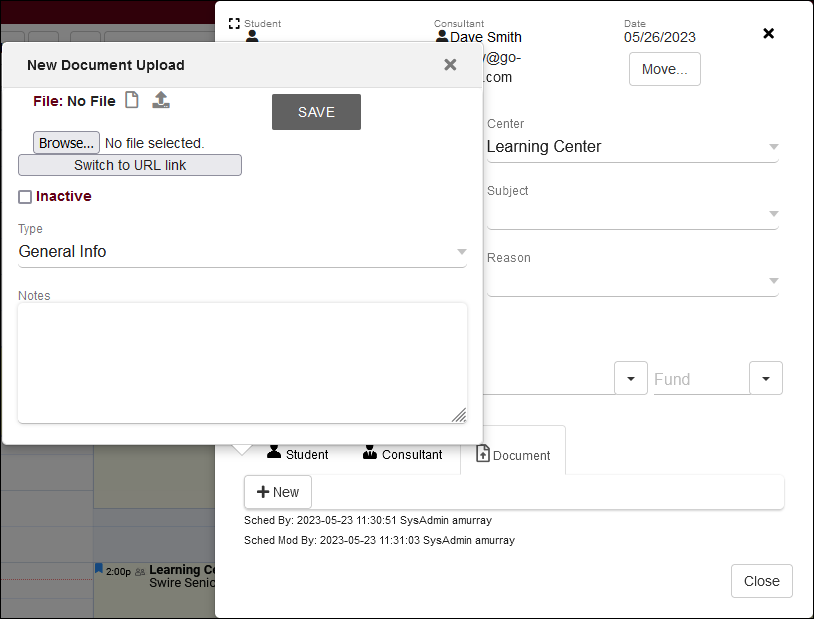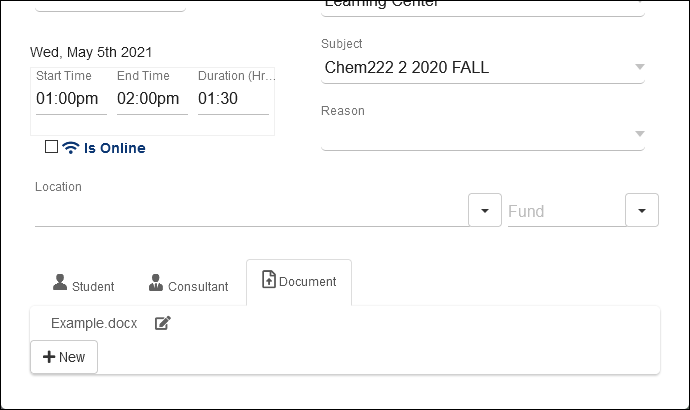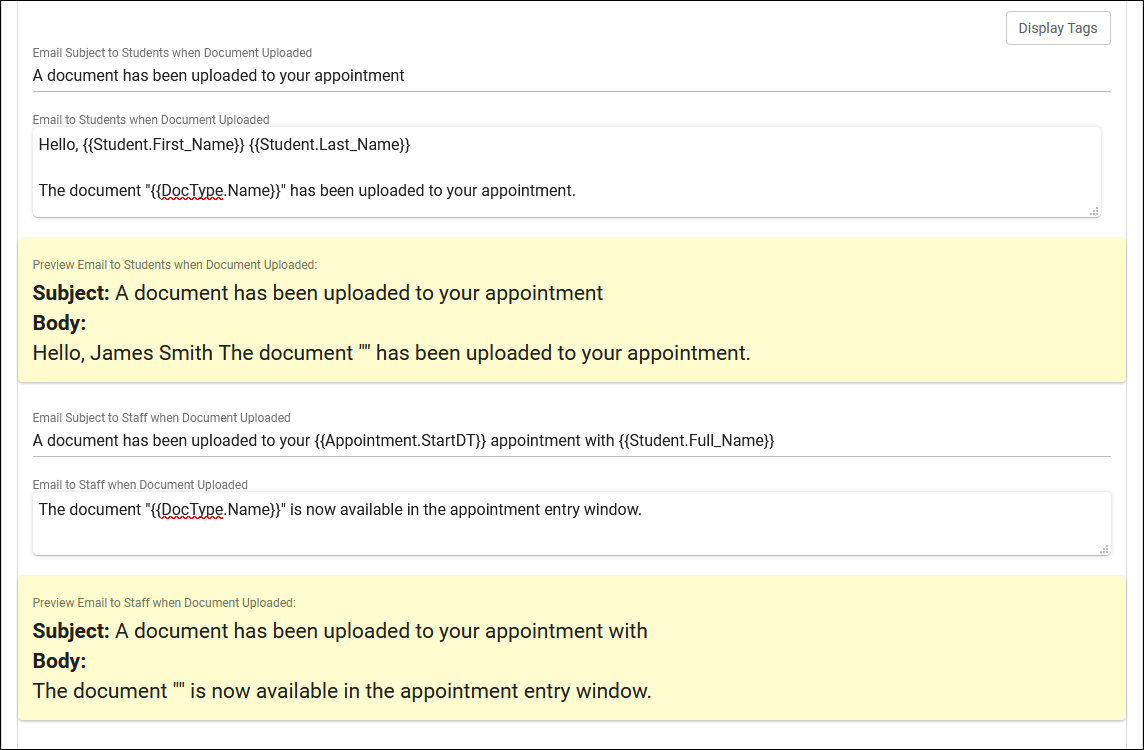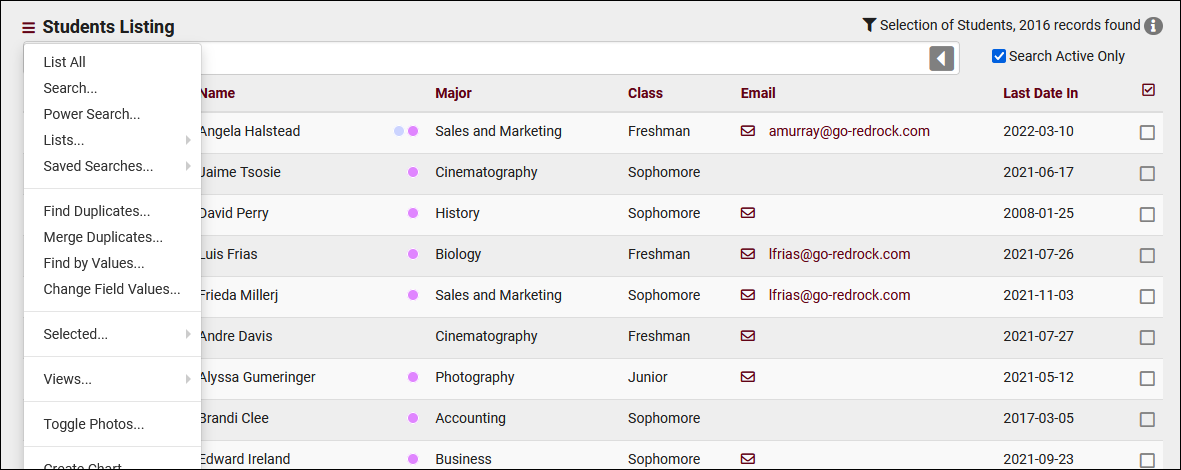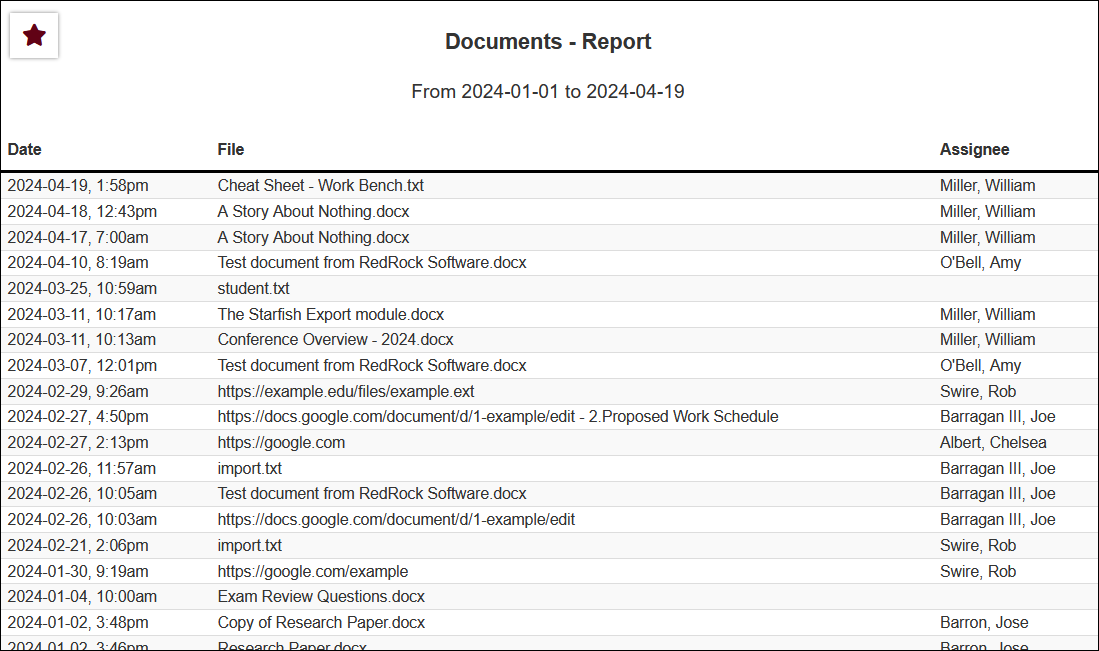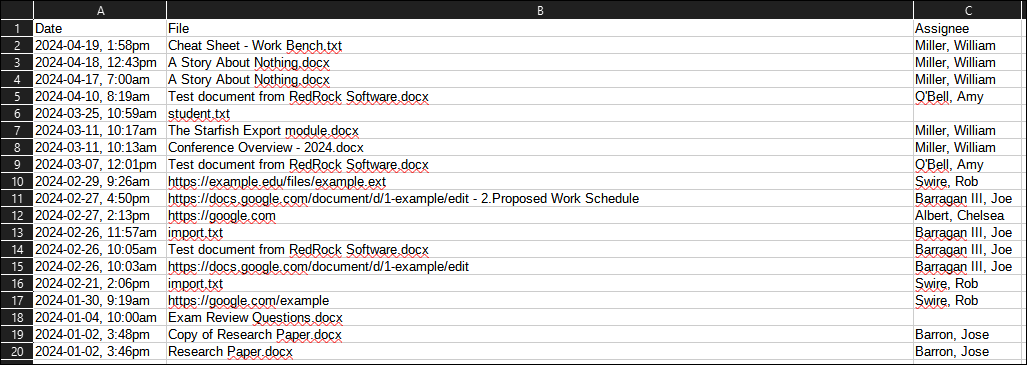TracCloud: Documents: Difference between revisions
From Redrock Wiki
No edit summary |
No edit summary |
||
| Line 106: | Line 106: | ||
<div style="float: left; margin-top: 0em; margin-bottom: 1em"><big><b>Documents Report</b></big></div><div class="mw-collapsible mw-collapsed"><br><br> | <div style="float: left; margin-top: 0em; margin-bottom: 1em"><big><b>Documents Report</b></big></div><div class="mw-collapsible mw-collapsed"><br><br> | ||
{{: | {{:TracCloud_Report:_Documents}} | ||
</div> | </div> | ||
Revision as of 22:28, 22 November 2024
Document Types
Documents can be used to upload files to student and staff accounts, appointments, visits, and even availabilities. These documents could be worksheets or assignments that students want to share with their consultants, administrative documents and intake applications stored in their profile, or any other files you may want to store in relation to a record. Each document is assigned a "Type," which allows you to designate who has access to files linked to that type and who can upload them. Access to document types is based on permission groups, detailed here.
To create a new type, click the + icon and click on the name of the document type to rename it.
Other > Other Options > Preferences > Document Types
Clicking the right-arrow opens a menu that allows you to choose who receives an email when a document of this type is uploaded.
Certain document types may need to be hidden or restricted for certain groups. Maybe they contain sensitive information, or the information simply isn’t relevant to all staff members (or students). To edit this access, you’ll need to go to the permission group that you want to edit, and define which Document types they can access in the “Document Types” section.
Other > Other Options > Groups > [Permission Group Name] > Center Access
Each Document Type can be assigned a different permission level by clicking on the colored icon. This cycles through the different options as described in the key above. "Edit" in this case includes uploading.
Uploading a document to a student or staff profile follows the same process and can be accomplished by clicking Actions, then selecting the document type you'd like to upload.
This will prompt you to upload the document (or paste a link to an online document), as well as input any notes that may be useful relating to this document.
After the document has been uploaded, it will be visible within the student/staff timeline tab. Accessing the document itself is as easy as clicking on the entry in the list, which will display a download link for the document as well as any notes that were previously entered. You may also edit the document notes here if needed, assuming your permission group allows it.
To allow students to view documents uploaded to their own profiles, you must first give the Students permission group access to the Document Type (same as staff groups, detailed above). After this, you must enable the dashboard utility for documents in Other > Other Options > Preferences > Student Entry Choices. Check Show/Allow Student Dashboard Documents on Main Menu to Students then save your changes.
Documents can also be uploaded directly to visits, appointments, or availabilities. With this ability, a student could upload an essay or worksheet that they need assistance with during the booking process, and their consultant could easily download it during the appointment. Alternatively, a document could be uploaded to the availability, allowing students to view it after booking the time slot. Visit documents can only be uploaded and accessed by staff. Within any of these record types, you will find a document upload option that looks similar to the screenshot below (which shows an appointment).
After the document has been uploaded, it will appear with the Document tab of the appointment. Multiple documents can be uploaded if needed. Appointment documents specifically are also frequently used for asynchronous appointments. For more information on that, click here.
When a document is uploaded to an appointment, an email can be automatically sent to the student, consultant, and/or center notifying them of this action. These emails support Twig and HTML, more information on utilizing Twig tags can be found in our dedicated Twig article.
In addition to accessing documents from appointments, visits, or user timelines, there's also a dedicated listing page for them. This can be accessed by going to Other > Listings > Documents. Documents can be uploaded here and manually linked to staff members as needed.
Hamburger Menu
Every listing page in the Trac System features a hamburger menu with utilities to search for or interact with your list of records. Some of these options are specific to a certain listing/record-type, others are shared. The following list includes definitions for the hamburger menu options available on this listing, and how they can be utilized.
- List All
- This option will show all records on the current listing. Some listings have an additional toggle for only showing "Active" records, such as Students and Registrations, which will still override a "List All" search if checked.
- This option will show all records on the current listing. Some listings have an additional toggle for only showing "Active" records, such as Students and Registrations, which will still override a "List All" search if checked.
- Power Search
- This option provides a simple but powerful search utility to find the records you need. String together multiple searches, adding or removing results for each. Use Search Symbols to include ranges of data, and Save Searches for later use if needed. The search term 'blankornull' can be used to find all records with a value of nothing ("") or null ().
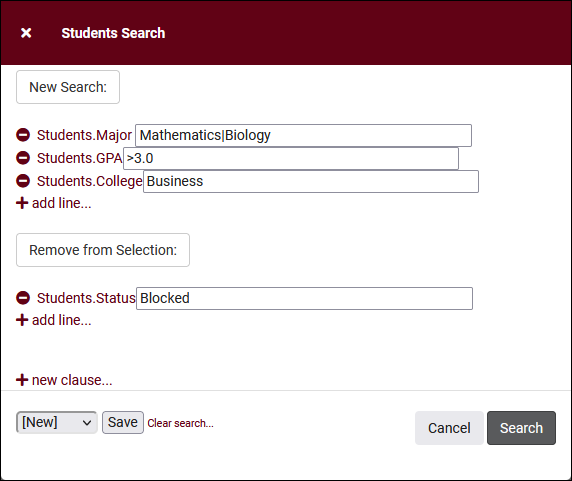
- Saved Searches
- See Saved Searches for more information.
- See Saved Searches for more information.
- Selected...
- The Selection Tool offers several options to filter and manage your records. More information on this feature can be found in its own dedicated article here.
- The Selection Tool offers several options to filter and manage your records. More information on this feature can be found in its own dedicated article here.
- Views
- See Views for more information.
- See Views for more information.
- Allows you to print the contents of the current listing, by extension this also allows you to export the current list as a PDF file.
- Allows you to print the contents of the current listing, by extension this also allows you to export the current list as a PDF file.
- New <Record>
- Allows you to create a new record based on your selected listing.
- Allows you to create a new record based on your selected listing.
The Documents report, found in Reports > Management, will display a list of uploaded documents with information about the file sorted by file name, assignee, date, document type, or who it was posted by.
- Time Frame
- The date range for the data in this report. Beyond entering a date range manually, you can also choose a preset date range (Today, This Month, This Semester, etc) from the dropdown list above.
- Sort by
- Choose how the selected data is sorted.
- Document Type
- Optionally filter results based on document type.
- Include Inactive Documents
- If checked, documents that have been deactivated will still be included in report results.
- Additional Search
- Filter your results by a selected field.
Use * as a wildcard (Subject: MAT*)
| as "or" (Major: Mathematics|Biology)
# as "Not" (Status: #Inactive)
&& as "And" (Major: #Mathematics&&#Biology)
blankornull as a keyword to find records where the field is blank (Reason: blankornull)
Multiple fields can be added to further narrow down your results.
- Filter your results by a selected field.
- Additional fields to show
- This can be used to add additional data fields to the report results. For example, you could use this to add a student's email address in a visit report.
- Output format
- Use HTML to view report data in your browser, or export this report to a CSV file (available for most reports). Some reports offer additional CSV options depending on if you want to include totals and/or data grouping in your export.
- Deliver to
- Display this report immediately in your browser ("Screen"), or send the report to a specified email address ("Email"). Multiple email addresses can be specified, use ; to separate them (example@example.edu;sample@example.edu).

